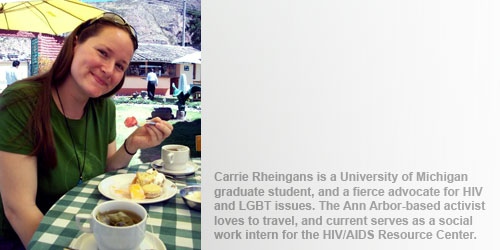By Jessica Carreras

Carrie Rheingans is a University of Michigan graduate student, and a fierce advocate for HIV and LGBT issues. The Ann Arbor-based activist loves to travel, and current serves as a social work intern for the HIV/AIDS Resource Center.
1 You're currently working on your master's degrees in public health and social work. What do you hope to do after graduating?
I hope that I can combine these fields and work with communities to improve their health status. It could be with a non-governmental organization, a governmental agency, a neighborhood, a city, a state or even a country in which people want to organize to improve their health. It really depends on what's available and hiring when I graduate!
I am fortunate to have a lot of international experience, so I may even work abroad. This summer, I'll be doing internships in China and Bangladesh, and at both organizations, they have requested training so they can conduct better HIV outreach, education and testing programs. Since this need exists, I may return to one of the organizations to help them realize their capacities.
2 I understand you're also multilingual. How does that help you in the work that you do, both with HIV/AIDS issues and otherwise?
My Bachelor of Science is in German and biology, and I have since learned Spanish, though I do not consider myself fully fluent in either. Knowing German doesn't currently help a lot (though it might at this year's International AIDS Conference in Vienna, Austria), but knowing Spanish is an invaluable skill I've been using for years.
In Michigan, I've used it to help link people to health care, explain community resources, do HIV test counseling, explain how HIV works and speak at public forums on behalf of those who would not. Spanish-speaking staff in human service organizations really help increase the access that people have to such organizations. Knowing Spanish was also an integral part of my internship last summer at the Peruvian AIDS organization Via Libre.
3 What do you do for the HIV/AIDS Resource Center?
I'm currently working in three main areas: social media internal policies, researching the relationship between young men who have sex with men that use the Internet for finding sexual partners and their HIV testing behaviors and community coalitions. We're finalizing our policies for board members, staff and volunteers who use social media, such as Facebook or photo-sharing sites. For the research project, I'll be conducting individual interviews and possibly focus groups, including the Spanish-language versions of each. I also represent HARC on the Michigan Coalition for Adolescent Sexual Health and the Spanish Healthcare Outreach Collaborative. In the past, I've been an AmeriCorps member with the National AIDS Fund – Team Detroit at HARC, the fund development coordinator and a volunteer in outreach, education and HIV test counseling.
4 What drove you to focus your work in HIV/AIDS?
The HIV and AIDS crisis has highlighted the stark inequalities and discrimination that exist in this world, and I believe that the skills learned and the rights gained from this struggle will be transferred to overcoming other inequalities.
I first learned about HIV in an immunology class, aside from what I heard in the news peripherally throughout my life. It wasn't long until I started realizing what affect it has on a person's body, on that person's family and on communities and entire world regions. It isn't fair that people who were already marginalized were some of those who were first affected, and are currently worst affected. This motivated me to learn more and to become a vocal advocate for the rights of marginalized people, with the goal of supporting people who want to demand their own rights.
5 How do you see yourself as connected to both the LGBT and the HIV communities?
I'm a strong ally to both communities, and I see myself as part of a greater network of resources and support for each community. A lot of my work revolves around youth, so I see myself as a kind of 'middle woman' between the teens/young adults and the older adults (I'm in my late 20s, so right in the middle). I really hope that my work helps people feel that they are supported and can take another step forward out of their comfort zone and toward their full rights, and know that I'm right there to support, whether it means pushing them forward or catching them if they fall back.
To learn more about HARC, visit http://www.hivaidsresource.org.










